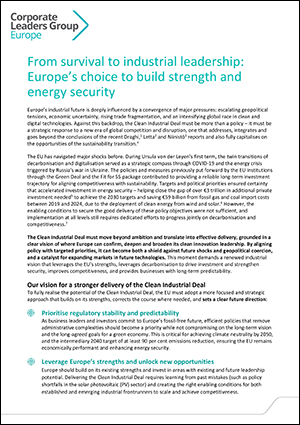17 June 2025 – CLG Europe manifesto calls for the Clean Industrial Deal to move beyond ambition and deliver tangible results. Grounded in a clear vision for Europe’s clean innovation leadership, it must align policy with strategic priorities to shield against global shocks, drive investment through decarbonisation, and provide long-term predictability for businesses.
Read the manifesto here
Europe stands at a crossroads. Faced with rising geopolitical tensions, economic uncertainty, and a global race for clean and digital technologies, the EU must act decisively. The Clean Industrial Deal is more than a policy – it is a strategic response to a new era of global disruption and opportunity.
To fully realise its potential, the EU must adopt a more focused and strategic approach, setting a clear future direction. This means prioritising regulatory stability, leveraging Europe’s strengths, unlocking new opportunities, scaling up clean industrial solutions, and leveraging EU’s global influence. By removing systemic barriers, enabling frontrunners to grow, and extending Europe’s global industrial leadership through fair trade and strategic partnerships, the CID can become the engine of a competitive, climate-neutral, and resilient European economy.
The CLG Europe Clean Industrial Deal manifesto outlines the following priority actions:
- Ground industrial decarbonisation investment in the climate target, aligning with the target of at least 90% emissions reduction by 2040 (target outlined and endorsed by more than 150 businesses and investors in CLG Europe 2040 climate target letter).
- Secure EU leadership in clean and circular economy technology, to remain globally competitive and reduce strategic dependencies.
- Demonstrate that decarbonisation is possible and beneficial, and it is already technically and economically viable.
- Close the finance gap and set the right framework, mobilising additional public finances and activating their leverage to boost private capital flows.
- Phase out fossil fuels and boost electrification, to strengthen long-term energy security and industrial resilience.
- Ensure the transition is fair and inclusive, as Europe’s industrial transformation must relate to the delivery of benefits across all regions and communities, especially for those facing structural industrial change.





